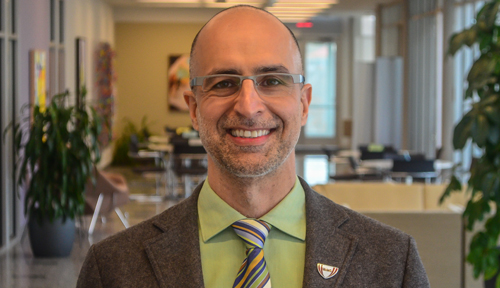A collaboration between UNMC’s College of Public Health and Nebraska Medicine is underway to use telehealth and remote patient monitoring to reduce readmissions and ER visits for patients who were discharged from the hospital with type 2 diabetes and related chronic conditions.
Clinical researchers want to establish a model for urban areas that will reduce costs and improve the quality of care for patients with diabetes who also have congestive heart failure, hypertension or acute myocardial infarction as well as other chronic conditions.
The primary aim of the “Remote Interventions Improving Specialty Complex Care” (RIISCC) program is to establish a payment model so telehealth and remote patient monitoring services can be a paid service through the Center for Medicare & Medicaid Services (CMS) and other insurers throughout the country in urban areas. Currently, this is only a paid service in rural areas across the country.
The goal is to enroll 3,300 patients in the remote patient monitoring program from urban Omaha areas by Aug. 31, 2017. Case management in this project relies heavily on teleconferencing with patients in their home for 90 days after discharge as well as daily uploads of their glucose reading, weight and blood pressure. Through this system, a team of providers from Nebraska Medicine monitors the patient.
The team will promote self-management with patients through weekly coaching and education, nutritional counseling, virtual foot exams, updated diabetes education goals, diabetic retinopathy screening and consultation, and an end-of-intervention hemoglobin A1C test for 90 days after discharge. Participants also will receive phone follow-up for nine months post-intervention.
“One of our biggest challenges has been patient enrollment,” said Tammy Slachetka, project director and clinic/grant manager for Nebraska Medicine. “One way we can increase this is by having physicians at Nebraska Medicine and Nebraska Medicine-Bellevue inform and encourage diabetic patients who have been admitted to the hospital to participate.”
Mohammad Siahpush, Ph.D., professor and chairperson, health promotion, social and behavioral health, College of Public Health, is the principal investigator. “The technology is now available to allow us to monitor our patients remotely and catch certain diabetes-related health problems before they become a larger issue that could possibly require a hospital stay or ER visit,” Dr. Siahpush said.
Diabetes care costs for Nebraskans were estimated at more than $1 billion between 2007 and 2012. “This will continue to increase at an alarming rate as more and more Nebraskans are diagnosed with diabetes each year. The average cost of care for a high-risk diabetic patient in Nebraska is $53,280 a year,” Dr. Siahpush said.

Great Article and a truly extraordinary man!